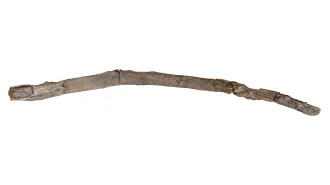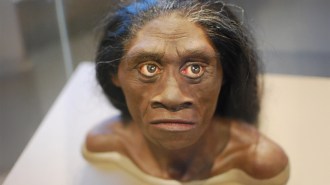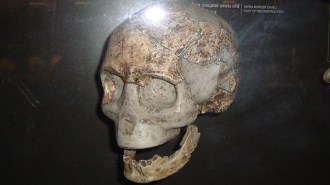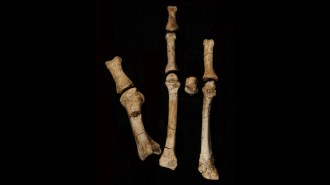In the Neandertal Mind
Our evolutionary comrades celebrated vaunted intellects before meeting a memorable demise
Call a person a Neandertal, and no one within earshot will mistake the statement for a compliment. It’s a common, convenient way to cast someone as a stupid, brutish lout. From an evolutionary perspective, the invective has no basis in truth, say archaeologist Thomas Wynn and psychologist Frederick L. Coolidge. This interdisciplinary duo, based at the University of Colorado in Colorado Springs, has drawn on a range of scientific research and prehistoric finds to reconstruct how Neandertals thought and even what their personalities might have been like. Forget the stereotype of these extinct human predecessors, Wynn and Coolidge assert; for tens of thousands of years, Neandertals were as smart as the ancient humans that lived alongside them.

The “expert Neandertal mind” fostered impressive toolmaking and social skills that made survival possible for at least 100,000 years in some of the harshest environments ever inhabited by members of the human evolutionary family, Wynn and Coolidge concluded in the April Journal of Human Evolution.
Beginning approximately 140,000 years ago, Neandertal groups mastered the art of living in relatively small regions of Europe and western Asia, each no more than perhaps 30 to 40 miles wide, the researchers say. In such familiar habitats, Neandertals operated at least as well as, and often better than, Homo sapiens that had migrated from Africa into the same territory.
Around 50,000 years ago, however, the evolutionary tide turned in a subtle, but ultimately crucial, direction. Members of H. sapiens experienced a slight boost in the amount of information that they could hold in mind at any one time, probably because of a genetic mutation that triggered a modest brain reorganization, Wynn and Coolidge propose. The capacity to remember and mentally manipulate a few more bits of related knowledge led to a series of breakthroughs: innovations in toolmaking, long-range planning for seasonal hunting expeditions, storytelling, and symbolic expression through artwork and personal ornaments.
Armed with these advances, the Colorado researchers say, late–Stone Age humans became better at adapting to novel circumstances. From their African homeland, H. sapiens groups fanned out farther and farther into the wilds of Europe and Asia, while Neandertals stuck to their home territories.
“We’re suggesting that, when making a stone tool or working on some other task, modern humans became able to hold more information in mind than Neandertals could,” Wynn says. “Neandertals sometimes innovated, but they didn’t reflect on innovations and rapidly improve on them, as people started to do around 50,000 years ago.”
Whether in frigid ice age settings or mild Mediterranean locales, Neandertals couldn’t effectively compete with the incoming H. sapiens, Wynn says. By about 30,000 years ago, Neandertals died out.
Ancient expertise
Scientists fall into two general schools of thought about what happened to the Neandertals. The minority view holds that modern humans are, in part, Neandertal descendants. For those in this camp, Neandertals were a heavy-boned, beetle-browed variant of H. sapiens, or at least so closely related to us that they blended into the broader human-gene pool through interbreeding (SN: 5/22/04, p. 328: Available to subscribers at Humanity’s Strange Face). Neandertals thus would have been biologically and mentally equal to H. sapiens.
The majority position, on the other hand, regards Neandertals as a distinct species in the Homo genus. Neandertals and their ancestors—who originated in western Europe as many as 800,000 years ago, according to fossil finds in Spain—evolved in cold areas, far from the African tropics that nurtured H. sapiens (SN: 6/14/03, p. 371: African Legacy: Fossils plug gap in human origins).
Artwork, ceremonial goods placed in graves, and other discoveries made mainly at Stone Age H. sapiens archaeological sites indicate to adherents of this view that our human ancestors won the evolutionary competition thanks to an early mental edge over Neandertals in areas such as symbolic thinking and planning for the future.
Wynn and Coolidge support the majority. When it came to practical skills, however, the two researchers suggest that Neandertals developed a modern type of expert knowledge.
A 1996 study found that skilled blacksmiths call on an extensive pool of practical knowledge to generate an overall plan of action for a project and to employ their tools and materials effectively in each stage of the job. Neandertals’ stone implements show signs of this type of skilled performance, according to Wynn and Coolidge.
These tools were made in three basic stages, apparently guided by a clear idea about what the finished product would look like. A roughly hand-size hunk of stone was first chipped around its outer edge. Pieces were then struck off the stone’s surface from both sides to create a sharp ridge meandering down its middle. Finally, a tool small enough to grasp was harvested from the prepared stone with a single blow. Sometimes, the Neandertal toolmakers detached several sharpened flakes from the same stone blank.
Prehistoric H. sapiens employed comparable toolmaking skills, at least until a transition period 50,000 to 40,000 years ago. Then a variety of thin, sharpened blades begins showing up in the archaeological record. No such signs of innovation in toolmaking appear at Neandertal sites, Wynn and Coolidge say.
This technological gulf suggests that H. sapiens, but not Neandertals, experienced a neural rearrangement, the researchers theorize. Recent studies indicate that brain networks for memories of intensively practiced procedures exist apart from regions that regulate thinking about new information and how it might apply to a task at hand, Coolidge notes.
Memory of the latter kind, known as working memory, allows one to modify a familiar skill on the fly to deal with novel or unexpected circumstances. It also transforms speech by enabling a person to string together clauses to issue commands and questions pertinent to immediate events. As Coolidge sees it, humanity’s proclivity for self-reflection and symbolic thinking grew out of such advances in memory.
Neandertals possessed their own powerful form of working memory, Coolidge proposes. But they lacked the new, improved version that appeared toward the end of the Stone Age in H. sapiens.
Humor me
Wynn and Coolidge’s portrait of technically proficient Neandertals doomed by a memory disadvantage elaborates on a theory championed by Stanford University anthropologist Richard Klein. Like the Colorado researchers, Klein argues that a brain-altering genetic mutation in H. sapiens around 50,000 years ago must have triggered ensuing bursts of symbolic expression and other types of cultural growth.
Wynn and Coolidge also take inspiration from archaeologist Steven Mithen of the University of Reading in England. In his 1996 book The Prehistory of the Mind (Thames and Hudson), Mithen proposed that Neandertals knew a lot about separate categories of knowledge, such as toolmaking, relations with fellow group members, and nature. H. sapiens went a step further, he surmised, by integrating those and other categories in their minds, leading to a uniquely flexible thinking style.
For instance, Neandertals thought separately about objects to be manipulated and about people. By mixing these categories, H. sapiens could think about people as objects to be manipulated. From there, in Mithen’s opinion, it was a short hop to forming racist attitudes toward minority groups. If he’s right, Neandertals had the wrong kind of thinking style to become racist.
The ability to weave disparate strands of information into stories would also have endowed prehistoric humans with a joke-making, humorous bent that Neandertals would have lacked, Mithen speculates. Given a limited working memory, Neandertals probably talked less and engaged in more regimented behaviors than Stone Age people did, Coolidge adds.
Competing interests
Even as they acknowledge the ambiguity that shrouds any reconstruction of ancient minds, some proponents of the view that Neandertals evolved separately from
H. sapiens see merit in Wynn and Coolidge’s view that some pivotal neuron shift occurred to set the two groups apart.
Cultural changes indeed blossomed in the archaeological record beginning about 50,000 years ago, even if scattered evidence of body ornaments and symbolic behavior dates to much earlier times among H. sapiens, says John J. Shea of the State University of New York, Stony Brook. Those cultural developments accompanied a geographical expansion of our species, at least in the Middle East, Shea proposes. Excavations there indicate that people retreated from the region between 80,000 and 50,000 years ago in the face of overwhelming competition from neighboring Neandertals. People, presumably with beefed-up working memory, returned in force around 40,000 years ago and then flourished. Neandertals went extinct soon thereafter.
“It could be that the technical intelligence of modern humans and Neandertals was similar, but the symbolic capacity of Neandertals was weak or nonexistent,” Shea says.
Stanley Ambrose of the University of Illinois at Urbana-Champaign also regards Wynn and Coolidge’s characterization of the Neandertal mind as plausible. However, he suspects that the key to evolutionary success rested less on working memory than on the sharing of information among groups. As among hunter-gatherers today, late–Stone Age H. sapiens apparently lived in groups that maintained regular contact with other nearby groups. That arrangement would have fostered a pooling of knowledge that would have greatly aided game hunting and foraging, Ambrose theorizes.
Unlike Wynn, Coolidge, and Klein, Ambrose contends that inter-group contact required only social innovations and not genetic mutations or brain changes. Early people learned to share information across groups that inhabited more variable, unpredictable habitats than Neandertals did, in his view. In contrast, Neandertals faced harsh but predictable conditions in northern lands, where most intrepid groups could operate on their own.
Culture questions
Researchers who regard Neandertals as having been no more different from Stone Age H. sapiens than today’s Eskimos are from African herders take a skeptical view of Wynn and Coolidge’s paper.
“We’re a long way from knowing whether there were significant interactions between Neandertals and Homo sapiens,” remarks Fred H. Smith of Loyola University in Chicago. “Attempts to reconstruct the cognitive abilities of those groups are speculative.” No one can say for sure which group was most responsible for cultural advances in Stone Age Europe, Smith says.
Consider Germany’s Vogelherd Cave, where 30,000-to-40,000-year-old ivory figurines and other artifacts have long been viewed as the handiwork of ancient H. sapiens. Recent radiocarbon measurements of the only human bones in the vicinity date the bones date to only several thousand years ago, says Nicholas J. Conard of Tübingen University in Germany. So, either ancient humans or Neandertals—who lived in that part of Europe at the same time—could have made the Stone Age items found at the site, Conard, Smith, and their coworkers report in the July 8 Nature.
The identity of ancestral groups that achieved late–Stone Age cultural advances throughout Europe is currently up for grabs, Conard argues.
Geoffrey A. Clark of Arizona State University in Tempe agrees. Investigators have chronicled considerable variety and innovation in Stone Age toolmaking styles, with a proliferation of regional techniques in Europe and western Asia from around 50,000 to 30,000 years ago, Clark says. That pattern fits with the theory that an aptitude for reflection and even symbolic thinking arose gradually in both Neandertals and H. sapiens, he argues, rather than bursting onto the scene solely among late–Stone Age humans, as presumed by Wynn and Coolidge.
The two Colorado researchers remain unfazed by such skepticism. Amid the din of scientific debate, they continue to ponder ways to peer further into the minds of our ancestors.






